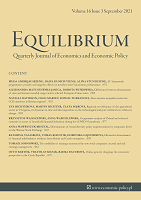Fiscal and redistributive impacts of the introduction of dynamic components in maternity benefits
Fiscal and redistributive impacts of the introduction of dynamic components in maternity benefits
Author(s): Daniela Danková, Renata Halásková, Ján ŠeboSubject(s): Economic policy, Welfare systems, Family and social welfare, Labour and Social Security Law
Published by: Instytut Badań Gospodarczych
Keywords: maternity benefits; social policy; work-life balance; redistribution impacts; fiscal impacts; microsimulation;
Summary/Abstract: Research background: Social security systems combine several subsystems aimed at addressing the risks of temporary or permanent loss of an individual's income. The subject of the research are parametric changes of alternative public policy aimed at addressing the temporary loss of income caused by the dropout from the labour market due to childcare. The effects of public policies may be fiscally neutral from the entire system, but not from the point of view of the individual. Purpose of the article: The purpose of this study is to examine the fiscal and redistributive effects of parametric changes in social insurance subsystem with an accent on maternity benefits in the conditions of the Slovak Republic by using a modified microsimulation model. Methods: Using a microsimulation model, we investigate the impacts of the alternative policy setting. Microsimulation model contains four basic modules (i) macroeconomic module, (ii) demographic module simulating future population structure from 2017 to 2080 (iii) status module modelling particular attributes (characteristics), (iv) social policy module. The model is applied to maternity benefits in two scenarios in the Slovak Republic: scenario 1 - the current legislative setting of maternity benefit policy parameters and scenario 2 - dynamic maternity benefit. Findings & value added: Results in the area of redistributive impacts in social insurance focused on maternity benefits show that dynamic policy parameters can positively affect work-life balance, especially for individuals with higher education. The results in the area of fiscal impacts show that the dynamic model of maternity benefits increases the efficiency of public spending and stimulates the faster return on the labour market. The results indicate the direction of possible government interventions and provide valuable information for policy makers in areas public policies that are associated with temporary labour market dropouts in the case of maternity.
Journal: Equilibrium. Quarterly Journal of Economics and Economic Policy
- Issue Year: 17/2022
- Issue No: 1
- Page Range: 103-131
- Page Count: 29
- Language: English

